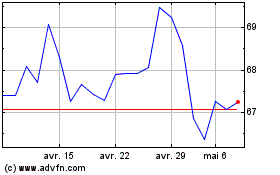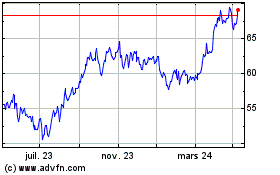Hassan Rouhani's Win Cheers Iran Business Leaders
20 Mai 2017 - 10:17PM
Dow Jones News
By Aresu Eqbali and Asa Fitch
TEHRAN -- Iranian business leaders were relieved Saturday after
moderate President Hassan Rouhani, a proponent of foreign
investment and engagement with the world, had secured another four
years in office.
Mohammad Lahouti, the head of the Iran Export Confederation, an
industry body, said domestic and foreign investors had been sitting
on their hands waiting to see if Mr. Rouhani would triumph over
hard-line cleric Ebrahim Raisi.
A Rouhani loss could have slowed deal-making, especially with
foreign investors wary of hard-liners' emphasis on economic
self-reliance.
"If Mr. Rouhani had not won, the world would be waiting to see
the new economic policies and the new way of interaction with the
world, and it could take longer to make such investments," Mr.
Lahouti said.
Mr. Lahouti pointed to the postponement in February by France's
Total SA of a decision on whether to invest in a $2 billion gas
project, which he attributed partly to skittishness over the
uncertain election.
"Ever since electoral activities started and different ideas
about investment surfaced, many foreign partners postponed to 'wait
and see,' " he said.
Total didn't immediately respond to a request for comment.
Mr. Rouhani has long sought to lift Iranian businesses' fortunes
by making it easier for them to transact with the world, part of a
strategy to spur job-creation for young people and lift economic
growth. Iran's economy is set to grow at 3.3% this year, according
to International Monetary Fund estimates.
Ascending to the presidency in 2013 on a platform of prosperity
through better relations with the world, Mr. Rouhani's team led
negotiations toward the landmark 2015 nuclear deal that removed
sanctions on Iran in exchange for curbs on its nuclear program.
Much foreign investment has since come into the country. Major
joint ventures were signed between French car makers and their
Iranian counterparts, hundreds of business delegations flew in to
explore opportunities, and the government revived its aging fleet
of jetliners, with multibillion-dollar purchases from Boeing Co.
and Airbus Group SE.
But the deal hasn't lined the pocketbooks of most Iranians,
leading to a decline in Mr. Rouhani's popularity, according to
polling in the months leading up to Friday's vote. It gave a boost
to Iran's energy exports, but wider economic impact remains limited
as many foreign financial institutions are still wary of dealing
with the country.
In the wake of his re-election, business leaders cautioned that
Mr. Rouhani will face an uphill battle as he works to expand Iran's
economy. Unemployment stands at more than 12%, and the country
ranks 131st of 176 countries in a Transparency International
corruption index.
Ahmad Pourfallah, managing director of Secco Iran, a
building-materials manufacturer, said Iran still hadn't
reintegrated into the global banking system after the nuclear deal
as rapidly as traders and investors had hoped.
Despite the lifting of sanctions, large international banks have
avoided doing business with Iran, after regulators in the U.S.
fined many of them billions of dollars for continuing to deal with
the country when sanctions were in place.
For other business leaders, the chief concern is continuing to
make space for the private sector by reducing the government's role
in the economy. The Iranian state has significant business holdings
covering swaths of the economy.
"We are demanding that the private sector of the country should
be the body implementing the economy," said Ferial Mostofi, a
mining, agriculture and trading company executive. "The government
should only supervise and give the policy, not interfere in the
economy."
In his first four years in office, Mr. Rouhani tried to steer
Iran's economy away from the monopolistic interests of the Islamic
Revolutionary Guard Corps, the military force overseen by Supreme
Leader Ayatollah Ali Khamenei.
The IRGC's fortunes rose under Mr. Rouhani's predecessor,
hard-line President Mahmoud Ahmadinejad. He allowed it to take
stakes in key state enterprises, including the Telecommunication
Company of Iran, the country's largest telecom.
Mr. Rouhani, a cleric and lawyer by training, has been less
friendly to IRGC interests.
Write to Asa Fitch at asa.fitch@wsj.com
(END) Dow Jones Newswires
May 20, 2017 16:02 ET (20:02 GMT)
Copyright (c) 2017 Dow Jones & Company, Inc.
TotalEnergies (EU:TTE)
Graphique Historique de l'Action
De Mar 2024 à Avr 2024

TotalEnergies (EU:TTE)
Graphique Historique de l'Action
De Avr 2023 à Avr 2024
